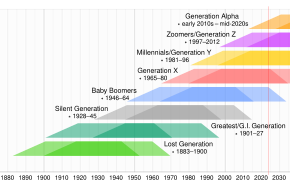
Back جيل صامت Arabic Silensyong Henerasyon BCL Generació silenciosa Catalan Silent Generation Czech Ήσυχη Γενιά Greek Generación silenciosa Spanish نسل خاموش Persian Génération silencieuse French הדור השקט HE Generasi Bisu ID
The examples and perspective in this article deal primarily with the United States and do not represent a worldwide view of the subject. (July 2021) |
| Part of a series on |
| Social generations of the Western world |
|---|
 |
The Silent Generation, also known as the Traditionalist Generation, is the Western demographic cohort following the Greatest Generation and preceding the baby boomers. The generation is generally defined as people born from 1928 to 1945.[1] By this definition and U.S. Census data, there were 23 million Silents in the United States as of 2019.[2]
In the United States, the Great Depression of the 1930s and World War II in the early-to-mid 1940s caused people to have fewer children and as a result, the generation is comparatively small.[3] It includes most of those who fought during the Korean War. Upon coming of age in the postwar era, Silents were sometimes characterized as trending towards conformity and traditionalism, as well as comprising the "silent majority".[4] However, they have also been noted as forming the leadership of the civil rights movement and the 1960s counterculture, and creating the rock and roll music of the 1950s and 1960s.[5]
In the United Kingdom, the Silent Generation was also born during a period of relatively low birthrates for similar reasons to the United States and was quite traditional upon coming of age. They lived through times of prosperity as young adults, economic upheaval in middle age, and relative comfort in later life. The Sixtiers is a similar age group in the Soviet Union whose upbringings were also heavily influenced by the troubles of the mid-20th century. The term "the builders" has been used to describe a similar cohort in Australia. Most people of the Silent Generation are the parents of Baby Boomers and older Generation Xers. Their own parents most commonly belonged to either the Greatest Generation or the Lost Generation.
- ^ "Is It Time to 'Pass the Torch?' The Generational Dilemma of the 2020 Democratic Primary". Time. July 30, 2019. Archived from the original on December 22, 2021. Retrieved December 22, 2019.
- ^ Fry, Richard (April 28, 2020). "Millennials overtake Baby Boomers as America's largest generation". Pew Research Center. Archived from the original on April 28, 2020. Retrieved June 8, 2020.
- ^ Howe, Neil (July 13, 2014). "The Silent Generation, 'The Lucky Few' (Part 3 of 7)". Forbes. Archived from the original on September 23, 2014. Retrieved October 21, 2014.
- ^ McLaughlin, Dan (February 16, 2016). "Closing The Book on the Silent Generation". National Review. Archived from the original on March 23, 2022. Retrieved April 23, 2018.
- ^ Menand, Louis (August 18, 2019). "The Misconception About Baby Boomers and the Sixties". New Yorker. Archived from the original on April 19, 2021. Retrieved April 21, 2021.